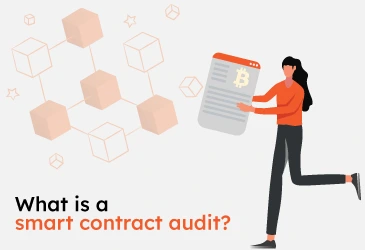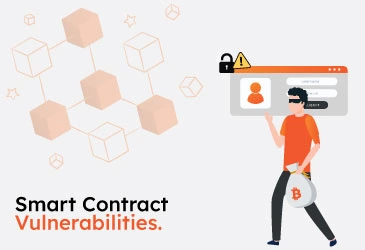Types Of Dapps
Updated : May 23, 2023

Smart contracts have become increasingly popular over the years as they provide a more efficient way of Decentralized applications, also known as dApps, have gained significant attention in recent years due to their potential to revolutionize various industries by leveraging blockchain technology. These innovative applications offer a range of functionalities, from finance and gaming to supply chain management and social networking. This comprehensive article will discuss the different types of dApps, providing insightful analysis and interesting information beyond the obvious. So, let's explore the exciting world of decentralized applications!
Financial DApps
Financial DApps have emerged as the cornerstone of the decentralized finance (DeFi) movement, revolutionizing traditional economic systems. These innovative applications leverage blockchain technology and smart contracts to provide users with seamless, secure, and transparent financial services.
Decentralized Exchanges (DEXs)
Decentralized exchanges are one of the most popular types of DApps. They enable peer-to-peer trading of digital assets without relying on intermediaries or centralized authorities. DEXs give users direct control over their funds and offer enhanced security compared to traditional exchanges. Notable examples include Uniswap, SushiSwap, and PancakeSwap
Decentralized Lending Platforms
Decentralized lending platforms allow users to lend or borrow digital assets directly from other individuals, eliminating the need for traditional financial intermediaries. These DApps use smart contracts to facilitate the lending process, ensuring the automatic execution of loan terms. Aave and Compound are well-known decentralized lending platforms in the crypto space.
Stablecoin DApps
Stablecoins are cryptocurrencies that aim to maintain a stable value by pegging them to a reserve asset, such as a fiat currency or a commodity. Stablecoin DApps provide users with a way to hold and transact in stablecoins. Tether (USDT), Dai, and USD Coin (USDC) are popular stablecoins with their respective DApps. You can also learn about Smart Contract Vulnerabilities.
Gaming and Collectibles DApps
Gaming and Collectibles DApps have transformed the gaming industry by introducing the concept of actual digital ownership and provable scarcity. Using non-fungible tokens (NFTs), these DApps enable players to own, trade, and monetize in-game assets, creating a thriving digital economy.
Blockchain-based Games
Blockchain-based games are revolutionizing the gaming industry by introducing actual ownership and interoperability of in-game assets. These DApps enable players to own, trade, and monetize virtual items using blockchain technology. CryptoKitties, Axie Infinity, and Decentraland are prominent examples of blockchain-based games.
Non-Fungible Token (NFT) Marketplaces
NFTs have taken the world by storm, allowing for tokenizing and owning unique digital assets.
NFT marketplaces facilitate the buying and selling of these one-of-a-kind items, including digital art, collectibles, virtual real estate, and more. OpenSea, Rarible, and SuperRare are leading NFT marketplaces empowering creators and collectors
Governance and DAO DApps
Governance and DAO (Decentralized Autonomous Organization) DApps are at the forefront of reimagining how organizations are managed and decisions are made. DAOs, governed by smart contracts and fueled by community participation, enable transparent and decentralized decision-making. These DApps empower token holders to vote on proposals, allocate funds, and shape the direction of projects.
Decentralized Autonomous Organizations (DAOs)
DAOs are organizations governed by smart contracts and operate without a centralized authority. These DApps enable collective decision-making and community governance, giving token holders voting rights and the ability to propose and fund projects. DAOstack, Aragon, and MolochDAO are notable examples of platforms facilitating DAO governance
Voting and Governance DApps
Voting and governance DApps extend beyond DAOs and provide decentralized solutions for voting and decision-making in various contexts, including decentralized networks and communities. They ensure transparency and inclusivity in decision-making processes. Gnosis, Boardroom, and Snapshot are popular platforms in this category.
Supply Chain and Identity DApps
Supply Chain and Identity DApps leverage the immutability and transparency of blockchain technology to address challenges in supply chain management and identity verification. Supply chain DApps enable end-to-end tracking, authentication, and proof of products, ensuring transparency, mitigating fraud, and enhancing consumer trust. On the other hand, identity DApps empower individuals with self-sovereign identity solutions, allowing users to control their data and selectively share it for various purposes, such as verification, access control, and privacy.
Supply Chain Management DApps
DApps for supply chain management leverage the blockchain's immutability and transparency to track and authenticate products throughout their lifecycle. These DApps help eliminate counterfeit goods, improve traceability, and ensure the integrity of supply chains. VeChain, Waltonchain, and IBM Food Trust are prominent players in this domain
Self-Sovereign Identity DApps
Self-sovereign identity DApps empower individuals to take control of their digital identities. By leveraging blockchain technology, these DApps provide a secure and decentralized way to manage personal information and control access. Self-sovereign identity DApps enable users to verify their identity without relying on centralized authorities, enhancing privacy and reducing the risk of data breaches. Sovrin, uPort, and Civic are notable projects in the self-sovereign identity space.
Social Media and Content Creation DApps
Social Media and Content Creation DApps are reshaping how we connect, share, and monetize content. Decentralized social networks provide users with enhanced privacy, ownership of data, and control over their online presence.
Decentralized Social Networks
Decentralized social networks aim to disrupt the centralized nature of traditional social media platforms by giving users complete control over their data and privacy. These DApps allow users to connect, share content, and engage in social interactions without relying on a central authority. Examples include Steemit, Minds, and Mastodon.
Content Publishing and Monetization DApps
Content publishing and monetization DApps enable creators to distribute and monetize their digital content directly, bypassing traditional intermediaries. These DApps use blockchain technology to ensure transparency, fair compensation, and copyright protection. Platforms like Brave, LBRY, and Publish0x are revolutionizing how content creators interact with their audiences.
Healthcare and Data Privacy DApps
Healthcare and Data Privacy DApps are revolutionizing the healthcare industry by addressing critical data security, privacy, and interoperability concerns. Electronic Health Record (EHR) DApps enable secure storage, sharing, and access to medical records, enhancing collaboration among healthcare providers and empowering patients to control their health data
Electronic Health Record (EHR) DApps
EHR DApps leverage blockchain technology to create secure and interoperable electronic health records. These DApps give patients greater control over their medical data while ensuring privacy, data integrity, and seamless data sharing among healthcare providers. MedRec and Medicalchain are pioneering projects in this field.
Data Privacy and Security DApps
Data privacy and security DApps aim to protect individuals' sensitive information from unauthorized access and ensure data integrity. These DApps use cryptographic techniques and decentralized storage solutions to safeguard user data while giving individuals control over who can access and utilize their personal information. Projects like Enigma, Ocean Protocol, and NuCypher are at the forefront of this space.
Let's Build The Future Together
Exploring the different types of DApps reveals the vast potential of blockchain technology to revolutionize various industries. DApps offer innovative solutions with enhanced security, transparency, and efficiency, from finance and gaming to supply chain management and decentralized social networks. As blockchain continues to evolve, the opportunities for creating and utilizing DApps will only increase.
If you want to leverage blockchain technology's power and develop your DApp, our Blockchain Development Services can help you bring your ideas to life. Whether you're a startup, an established business, or an entrepreneur, our experienced developers can provide tailored solutions to your needs. Don't miss out on the benefits of decentralized applications—contact us today, and let's build the future together.
Take control of your smart contract security - Request a professional Smart Contract Audit today and ensure the solidity of your blockchain projects
Insights

What Is A Smart Contract Audit?
Smart contracts are self-executing agreements that run on a blockchain network, allowing for secure and decentralized transactions. Smart contracts ...

Smart Contract Vulnerabilities
Smart contracts have revolutionized how we conduct transactions and execute agreements in the digital age. These self-executing programs ...

Smart Contract Audit Checklist
Smart contracts are self-executing agreements with the terms of the agreement between buyer and seller being directly written into lines of code ...